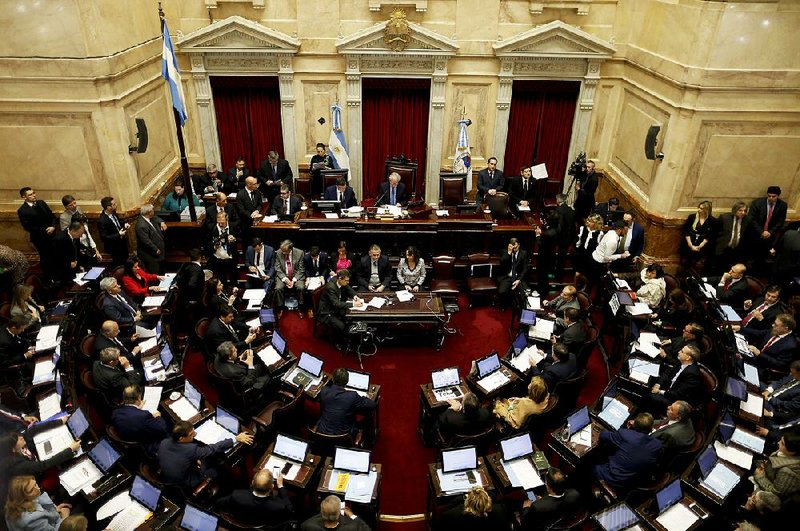BUENOS AIRES, Argentina -- Argentina on Wednesday prepared for a showdown over a bid to broadly legalize abortion, turning the country into South America's latest battleground over the long-taboo procedure.
Crowds of supporters and opponents rallied outside Congress, separated by riot fences and police. Those in favor waved green banners and formed drum circles. Those against bore the light blue of the Argentine flag, and several demonstrators carried a giant, cardboard fetus.
Argentine law permits abortion only in the case of rape, when the mother is mentally disabled, or there is serious risk to her health. Seeking an abortion for any other reason can land a woman in prison for up to four years. Health professionals involved in the operation also can go to prison for up to six.
"It should be a woman's right to decide," said Vilma Ripoll, a member of the National Campaign for Legal, Safe and Free Abortions. "May those who want to have an abortion be able to get one," she added, and everyone have access to proper medical care.
Argentina is the latest South American nation to grapple with the legalization of abortion -- something long banned throughout a region where the majority of people are Catholic. In 2012, Uruguay decriminalized it. Last year, lawmakers in Chile approved legislation legalizing abortion under limited circumstances. Last week, Brazil's Supreme Court also began considering decriminalization, prompting impassioned debate and protests.
The Argentine bill -- which cleared the lower house in June, setting up a vote in the Senate scheduled for Wednesday -- would allow girls as young as 13 to terminate a pregnancy for any reason within the first 14 weeks of term. The legislation also would require that abortions be carried out within five days of the woman's request.
As the bill has made its way through Congress this year, its advocates have flooded the streets of the capital, as well as other major Argentine cities. But away from the more left-leaning urban parts of Argentina, opposition to the bill has run deep in more rural, conservative communities.
Argentina is the birthplace of Pope Francis. Since assuming the papacy in 2013, the pontiff has largely refrained from inserting himself in domestic politics. He had not directly commented on the abortion bill, but two days before the lower house voted on the measure in June, Francis appeared to compare abortion sought for reasons of birth defects to Nazi eugenics.
"Last century, everyone was scandalized by what the Nazis did to ensure the purity of the race," he said. "Today, we do the same but with white gloves."
Religious figures across the country have openly opposed the bill. Senators appear to be deeply divided over how to address the several hundred thousand clandestine abortions that are estimated to be taking place in Argentina each year, many of which are performed in unsanitary conditions by unlicensed practitioners.
Thousands of anti-abortion advocates, sometimes from the most distant provinces of the country, arrived in Buenos Aires over the weekend.
"God gave us life," Anto Sosa, 33, of Entre Rios, said during a Saturday rally. "And trying to eliminate a life as the first solution -- it's not right."
The debate is unfolding in a nation considered one of the most progressive in Latin America. In 2010, it became the first in the region to legalize same-sex marriage. And in next year's elections, there will be a 50 percent legislative "gender quota."
Over the past 13 years, six abortion bills have been introduced in Argentina's Congress.
None made it out of the lower house. This one managed to squeeze past after a 22-hour debate, with 129 lawmakers voting in favor and 125 against.
A conservative businessman, President Mauricio Macri has expressed open opposition to legal abortion. But he said this year that Congress should work out the issue and promised not to veto any legislation that manages to reach his desk.
Anti-abortion advocates say Congress should focus more of its efforts on reproductive health and education services, which continue to lag behind more developed countries.
About 60 percent of pregnancies in Argentina are unplanned, especially among low-income and rural families.
But those in favor of the bill argue that it will offer women, who are forced to seek risky, clandestine abortions, a far safer alternative.
"We consider abortion to be the last option," said Marta Alanis, a founder of Catholics for the Right to Decide. "First, there has to be sexual education that guarantees correct contraception. And, well, if that fails, there has to be legal abortion, too."
A Section on 08/09/2018
